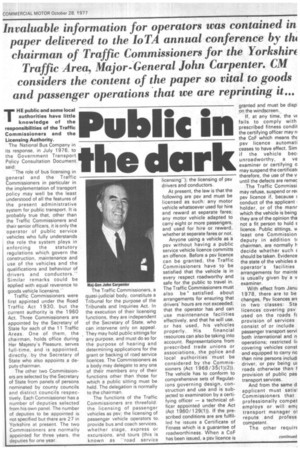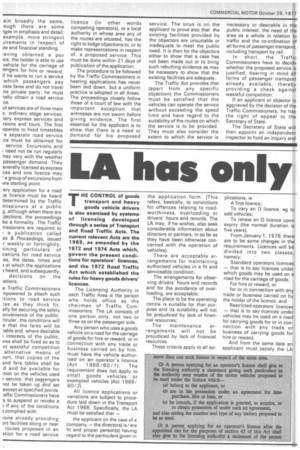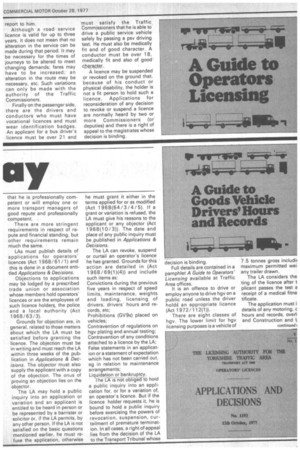ublic e dar
Page 47

Page 48

Page 49

If you've noticed an error in this article please click here to report it so we can fix it.
THE public and some local authorities have little knowledge of the responsibilities of the Traffic Commissioners and the Licensing Authority.
The National Bus Company in its response, in July 1976, to the Government Transport Policy Consultation Document said: "The role of bus licensing in general and the Traffic Commissioners in particular in the implementation of transport policy may well be the least understood of all the features of the present administrative system for public transport. It is probably true that, other than the Traffic Commissioners and their senior officers, it is only the operator of public service vehicles who fully understands the role the system plays in enforcing the statutory regulations which govern the construction, maintenance and use of the vehicles and the qualifications and behaviour of drivers and conductors." Similar remarks could be applied with equal reverence to goods vehicle licensinq."
Traffic Commissioners were first appinted under the Road Traffic Act 1930, but the current authority is the 1960 Act. Three Commissioners are appointed by the Secretary of State for each of the 11 Traffic Areas. One of them, the chairman, holds office during Her Majesty's Pleasure, serves full-time, and is appointed, directly, by the Secretary of State who also appoints a deputy chairman.
The other two Commissioners are selected by the Secretary of State from panels of persons nominated by county councils and district councils respectively. Each Commissioner has a number of deputies selected. from his own panel. The number of deputies to be appointed is not specified but there are 27 in Yorkshire at present. The two Commissioners are normally appointed for three years, the deputies for one year.
The Traffic Commissioners, a quasi-judicial body, constitute a Tribunal for the purpose of the Tribunals and Inquiries Act. In the execution of their licensing functions, they are independent of the Secretary of State, who can intervene only on appeal. They may hold public sittings for any purpose, and must do so for the purpose of hearing and determining applications for the grant or backing of road service licences. The Commissioners as a body may delegate to any one of their members any of their functions other than those for which a public sitting must be held. The delegation is normally to the chairman.
The functions of the Traffic Commissioners are threefold, the licensing of passenger vehicles as psv; the licensing of passenger vehicle operators to. provide bus and coach services, whether stage, express or excursions, and tours (this is known as "road service licensing"); the licensing of psv drivers and conductors.
At present, the law is that the following are psv and must be licensed as such: any motor vehicle whatsoever used for hire and reward at separate fares; any motor vehicle adapted to carry eight or more passengers, and used for hire or reward., whether at separate fares or not.
Anyone using a vehicle as a psv without having a public service vehicle licence committs an offence. Before a psv licence can be granted, the Traffic Commissioners have to be satisfied that the vehicle is in every respect roadworthy and safe for the public to travel in. The Traffic Commissioners must also be ' satisfied about arrangements for ensuring that drivers' hours are not exceeded; that the operator has and can use maintenance facilities effectively, and that he will use, or has used, his vehicles properly. His financial resources can also be taking into account. Representations from prescribed trade unions or associations, the police and local authorities must be considered by the Commissioners (Act 1968/36(1)(2)). The vehicle has to conform to comprehensive sets of Regulations governing design, construction and use and is subjected to examination by a certifying officer — a technical officer appointed under :the Act (Act 1960/129(1)). If the prescribed conditions are are fulfilled he issues a Certificate of Fitness which is a guarantee of roadworthiness. When a CoF has been issued, a psv licence is granted and must be displ on the windscreen..
If, at any time, the vf fails to comply with prescribed fitness condit the certifying officer may n the CoF which means thE psv licence automati ceases to have effect. Sim if the vehicle bec, unroadworthy, a ve examiner or certifying o may suspend the certificatt therefore, the use of the v until the defects are remec
The Traffic Commissi may refuse, suspend or re psv licence if, because ( conduct of the applicant holder, or of the manr which the vehicle is being they are of the opinion tha not a fit person to hold s licence. Public sittings, v% least one Commission deputy in addition ti chairman, are normally h decide whether such E should betaken. Evidence the state of the vehicles a operator's facilities arrangements for mainte is usually given by a v examiner.
With effect from Janu 1978, there are to be changes, Psv licences arc in two classes: Sta licences covering psv used on the roads fc provision of services consist of or include passenger transport servi both international and n operations; restricted lii covering vehicles const and equipped to carry no than nine persons includ: driver, or psv being u: roads otherwise than f provision of public pas transport services.
And from the same d applicant must satis1 Commissioners that professionally compet employs or will ernr transport manager cd repute and profess competent.
The other requirE
am n broadly the same, ough there are some -iges in emphasis and detail; example, more stringent Jirements in respect of ite and financial standing.
laving obtained a psv ice, the holder is able to use vehicle for the carriage of iengers for hire or reward, if he wants to run a service which passengers pay irate fares and do not travel ne private party, he must ially obtain a road service ce.
ut services are of three main s: ordinary stage services, -rary express services and rsions and tours. The first operate to fixed timetables
a separate road service ce must be obtained for service. Excursions and ; need not be run regularly nay vary with the weather passenger demand. They enerally licensed as express ces and one licence may a group of excursions from me starting point.
• ery application for a road ise licence must be heard determined by the Traffic missioners at a public g, although when there are Djections, the proceedings be a formality. The Traffic nissioners are required to a publication called es & Proceedings, issued r weekly or fortnightly, lining particulars of cations for road service :es, the dates, times and at which the applications ? heard, and subsequently, decisions on the :ations.
e Traffic Commissioners -npowered to attach such itions to road service :es as they think fit, ally for securing the safety onvenience of the public. ticular, the conditions will e that the fares will be iable and, where desirable
interests of the public, ires shall be fixed so as to nt wasteful competition alternative means of )ort, that copies of the and fare tables shall be d and be available for ;lion on the vehicles used service; that passengers lot be taken up and set except at specified points. 'affic Commissioners have s to suspend or revoke a ? if any of the conditions t complied with.
tone already providing art facilities along or near routes proposed in an ?tion for a road service licence (in other words competing operators), or a local authority in whose area any of the routes are situated, has the right to lodge objections to, or to make representations in respect of, a proposed service. This must be done within 21 days of publication of the application.
The procedure to be followed by the Traffic Commissioners in hearing applications has never been laid down, but a uniform practice is adopted in all Areas. The proceedings closely follow those of a court of law with the important exception that witnesses are not sworn before giving evidence. The first essential for the applicant is to show that there is a need or demand for his proposed service. The onus is on the applicant to prove also that the existing facilities provided by the objectors are unsuitable or inadequate to meet the public need. It is then for the objectors either to show that a case has not been made out or to bring such rebutting evidence as may be necessary to show that the existing facilities are adequate.
The Traffic Act provides that (apart from any specific objection) the Commissioners must be satisfied that the vehicles can operate the service without exceeding the speed limit and have regard to the suitability of the routes on which the service is to be provided. They must also consider the extent to which the service is necessary or desirable in the public interest, the need of the area as a whole in relation to traffic and the co-ordination of all forms of passenger transport, including transport by rail.
In short, the Traffic Commissioners have to decide whether the proposed service is justified, bearing in mind all forms of passenger transport already available, thereby providing a check against wasteful competition.'
If an applicant or objector is aggrieved by the decision of the Traffic Commissioners, he has the right of appeal to the Secretary of State.
The Secretary of State will then appoint an independent inspector to hold an inquiry and report to him.
Although a road service licence is valid for up to three years, it does not mean that no alteration in the service can be made during that period. It may be necessary for the times of journeys to be altered to meet changing demands; fares may have to be increased; an alteration in the route may be necessary, etc. Such variations can only be made with the authority of the Traffic Commissioners.
Finally on the passenger side, there are the drivers and conductors who must have vocational licences and must wear identification badges. An applicant for a bus driver's licence must be over 21 and
'must satisfy the Traffic. Commissioners that he is able to drive a public service vehicle safely by passing a psv driving test. He must also be medically fit and of good character. A conductor must be over 18, medically fit and also of good
character.. • A licence may be suspended or revoked on the ground that, because of his conduct or physical disability, the holder is not a fit person to hold such a licence. Applications for reconsideration of any decision to revoke or suspend a licence are normally heard by two or more Commissioners (or' deputies) and there is a right of appeal to the magistrates whose decision is binding.




















































































































